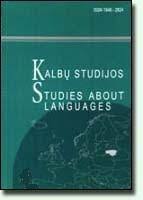Palyginamojo tekstyno kūrimo principai, problemos ir panaudojimo galimybės
Principles of Comparative Corpus Development, Its Problems and Use Possibilities
Author(s): Jurgita MikelionienėSubject(s): Theoretical Linguistics, Applied Linguistics, Evaluation research, Philology
Published by: Kauno Technologijos Universitetas
Keywords: Comparative corpus development; Usage of language; Lithuanian linguistics;
Summary/Abstract: Corpus is a programmically processed collection of electronical texts; which aims at reflecting the real usage of language. Due to its volume availability, linguitic and encyclopaedic knowledge and other specific features the corpus has been considered next to the main and highly reliable method and means of language investigation in the world science of language. Corpus linguistics has become an inseparable component of one of the most perspective branches of language science – computer linguistics. Composing of comparative corpus that is of new type in the Lithuanian linguistics has been started at Kaunas University of Technology. This is a bilingual Lithuanian-English corpus that reflects the usage of one functional style – modern scientific language. Thematics of the texts is concrete and strictly limited – language of technology (chemistry, logistics, electricity, informatics, etc.) sciences. The paper presents the model of the composed corpus, discusses main problems, emphasizes the criteria of the material search and selection, analyzes the issue of the corpus pragmatism and applicability (terminology, lexicography, translation, etc).
Journal: Kalbų Studijos
- Issue Year: 2002
- Issue No: 3
- Page Range: 55-59
- Page Count: 5
- Language: Lithuanian

